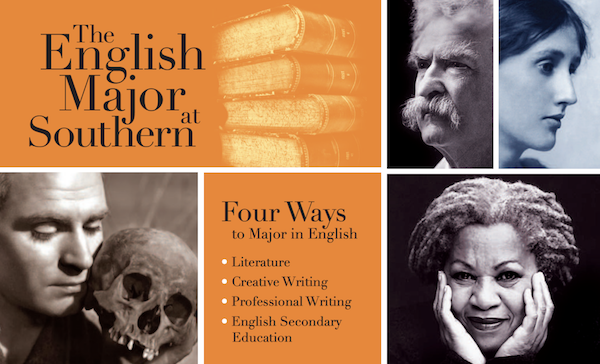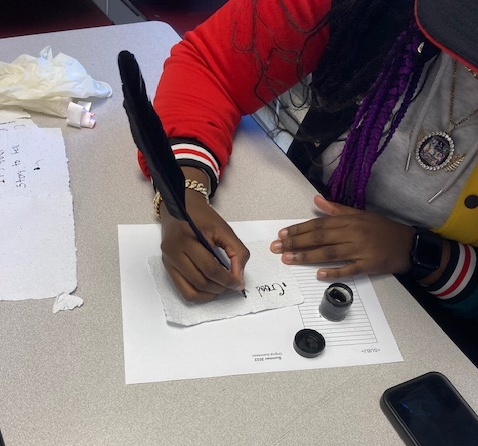
Planning your English Major

Getting Started in English
The gateway to the English major at Southern is Literary Analysis for English Majors (ENG 307), which is a rigorous introduction to how to read poetry, fiction, and drama at the college-level, and one of the most dynamic courses in the department. You can register for ENG 307 after having completed your first-year writing course – ENG 112 or HON 150.
As a new major, you’ll declare a specialization - Literature, Professional Writing, or Creative Writing, or English Secondary Education (see below). The first three are “concentrations” within the Bachelor of Arts in English, the standard liberal arts degree. English Secondary Education is a separate Bachelor of Science degree reserved for those pursuing certification to teach middle or high school English; click on the following link for information about how to apply to the BS in English Secondary Education program.
After declaring your major and specialization, you’ll be assigned a faculty advisor who will help you choose courses, talk about careers, find study abroad and internship opportunities, and modify your degree program or concentration as necessary. For help with declaring the major or English advisors, contact the English chair or secretary.
Understanding Your Degree Requirements (43 Credits)
The English major is designed to offer a variety of courses in English studies, English education, creative writing, and professional writing. As a member of the department, you’ll get a solid grounding in the basics of English studies while also being able to choose your area of concentration and courses you can use to fulfill those requirements. Majors in all areas share a set of “core” courses focused primarily on literary studies, as well as rhetoric and theory. Further courses are selected according to your particular interests and specialization.
English Core courses for all Specializations:
ENG 307 – Literary Analysis for English Majors (must be taken at SCSU)
ENG 308 – English Studies: Critical Theories (must be taken at SCSU)
ENG 490 – Advanced Seminar in Literature (must be taken at SCSU)
ENG 491 – Career Preparation in English (must be taken at SCSU)
Specializations:
English Studies (B.A.)
The English Studies concentration immerses students in writing from a broad array of literary periods, genres, authors, and topics while exploring the integral relationships between literature and history, in all its dimensions, including political, aesthetic, cultural, and social history. Our students thus learn to tap literature’s potential to tell us about lives, experiences, and ideas both near and far from their own, thus complicating, extending, and enriching their understanding of themselves and others. Students learn to practice a variety of analytical and critical methods, and to communicate their insights and ideas via effective writing and intelligent discussion, skills that are infinitely valuable no matter what career you end up pursuing.
In addition to the four core courses listed above, English Studies students will also take courses in the following categories:
View Course Options for each category:
- Writing in Practice (One course)
- Early and Colonial Literature (Two courses)
- Eighteenth- and Long Nineteenth-Century Literature (One course)
- Modern and Contemporary Literature (One course)
- Multicultural Literatures (One course)
- English Studies (Five courses)
Creative Writing (B.A.)
The Creative Writing concentration supplements all the advantages of literary studies with intensive practice and instruction in the creation of new literary writing by student poets and fiction writers. Separate sequences of courses in poetry and fiction writing are student-centered and workshop-based, offering you a supportive writing community within which to receive rigorous feedback on your work, both from your peers and from our experienced faculty of published writers. The concentration also offers the opportunity of culminating your studies with a creative thesis.
In addition to the four core courses listed above, Creative Writing students will also take courses in the following categories:
View Course Options for each category:
- Writing in Practice (One course)
- Early and Colonial Literature (Two courses)
- Eighteenth- and Long Nineteenth-Century Literature (One course)
- Modern and Contemporary Literature (One course)
- Multicultural Literatures (One course)
- Creative Writing (Five courses)
Professional Writing (B.A.)
The Professional Writing concentration offers practical training in various kinds of workplace writing. You will learn to design and write information that meets the needs of businesses and other institutions for both internal communication among employees and external communication to customers and constituents. Courses include instruction in effective use of both traditional media (memos, reports, correspondence) and emergent media (social media, email, webpages). Students will develop strong communication skills to meet informational and instructional needs of a variety of workplace settings.
In addition to the four core courses listed above, Professional Writing students will also take courses in the following categories:
View Course Options for each category:
- Writing in Practice (One course)
- Early and Colonial Literature (Two courses)
- Eighteenth- and Long Nineteenth-Century Literature (One course)
- Modern and Contemporary Literature (One course)
- Multicultural Literatures (One course)
- Professional Writing (Five courses)

Secondary Education (B.A.)
The English Secondary Education concentration prepares students for careers in middle school and high school English education. Students take a series of professional courses in the College of Education and a series of methods courses in the English department in addition to core courses in English language and literature. The program concludes with a full semester student teaching internship, and successful program completers earn certification to teach English in grades 7-12 in Connecticut.
For more information, see the BS in English Secondary Education page.
